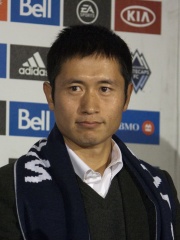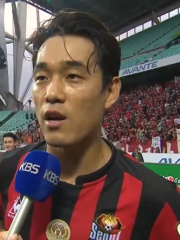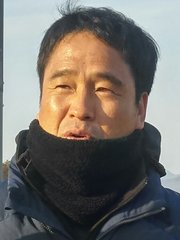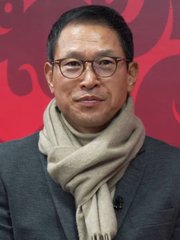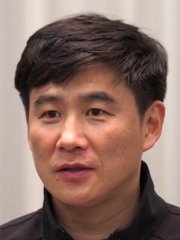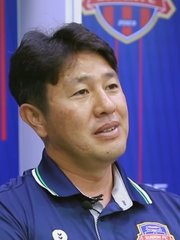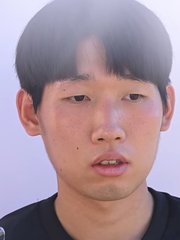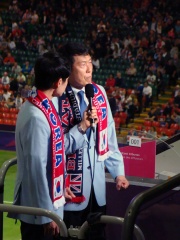
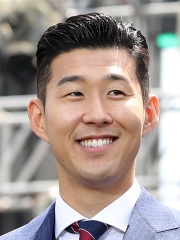
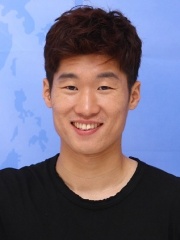
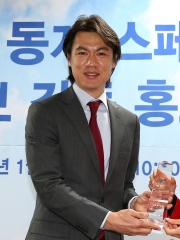
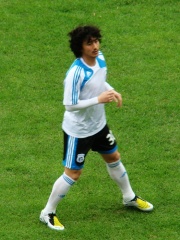

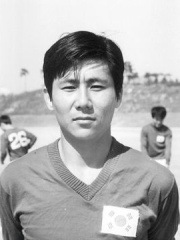
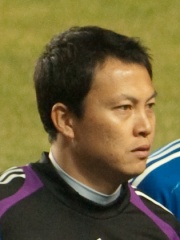
The Most Famous
SOCCER PLAYERS from South Korea
This page contains a list of the greatest South Korean Soccer Players. The pantheon dataset contains 21,273 Soccer Players, 167 of which were born in South Korea. This makes South Korea the birth place of the 30th most number of Soccer Players behind Hungary, and Colombia.
Top 10
The following people are considered by Pantheon to be the top 10 most legendary South Korean Soccer Players of all time. This list of famous South Korean Soccer Players is sorted by HPI (Historical Popularity Index), a metric that aggregates information on a biography's online popularity. Visit the rankings page to view the entire list of South Korean Soccer Players.

1. Cha Bum-kun (b. 1953)
With an HPI of 70.61, Cha Bum-kun is the most famous South Korean Soccer Player. His biography has been translated into 35 different languages on wikipedia.
Cha Bum-kun (Korean: 차범근; Korean pronunciation: [tɕʰɐbʌmɡɯn] or [tɕʰɐ] [pʌmɡɯn]; born 22 May 1953) is a South Korean former football manager and player. A forward, he was nicknamed Tscha Bum or "Cha Boom" in Germany because of his name and thunderous ball striking ability. He showed explosive pace and powerful shots. He is widely regarded as one of the greatest Asian footballers of all time. In 1972, Cha had been capped for the South Korea national team as the youngest player of the time at the age of 18. He is the youngest player to ever reach 100 international caps in the world at 24 years and 35 days, and the all-time leading goalscorer of the South Korean national team with 58 goals. After dominating Asian competitions including the 1978 Asian Games, he left for West Germany and played for Eintracht Frankfurt and Bayer Leverkusen. He scored a total of 121 goals in two Bundesliga clubs, and won the UEFA Cup with each team. After his retirement, he opened a football academy to develop youth players in South Korea, and managed the national team for the 1998 FIFA World Cup.

2. Son Heung-min (b. 1992)
With an HPI of 67.72, Son Heung-min is the 2nd most famous South Korean Soccer Player. His biography has been translated into 73 different languages.
Son Heung-min (Korean: 손흥민; pronounced [son.ɣɯŋ.min]; born 8 July 1992) is a South Korean professional footballer who plays as a forward for Major League Soccer club Los Angeles FC and captains the South Korea national team. Known for his speed, finishing, two-footedness, and ability to link play, he is the top Asian goalscorer in both Premier League and UEFA Champions League history, and is widely regarded as the greatest Asian player of all time. Born in Chuncheon, South Korea, Son relocated to Germany to join Hamburger SV at 16, making his debut in the Bundesliga in 2010. In 2013, he moved to Bayer Leverkusen for a club record €10 million before signing for Premier League club Tottenham Hotspur two years later. While at Spurs, Son soon established himself as one of the best forwards in the world. He contributed to the club reaching the Champions League final in 2018–19 and the EFL Cup final in 2020–21. In 2019–20, Son scored a solo effort in the league that earned him the FIFA Puskás Award. In the 2021–22 season, he jointly won the Premier League Golden Boot award with 23 goals, becoming the first Asian player to win it. In April 2023, he became the first Asian player to score 100 Premier League goals. Appointed club captain later in 2023, he led Spurs to the UEFA Europa League title, his first major honour, in 2025, his final season, while also ending a 17-year trophy drought for the club. A full international since 2010, Son has represented South Korea at the 2014, 2018, and 2022 FIFA World Cups and is his country's joint top scorer at World Cups, tied with Park Ji-sung and Ahn Jung-hwan on three goals. Son has also represented South Korea at the 2018 Asian Games, where the team won gold, and the 2011, 2015, 2019, and 2023 editions of the AFC Asian Cup; Korea was the runner-up in 2015. Outside of football, Son is viewed as a symbol of national pride in South Korea for his achievements, and has been listed in Forbes Korea Power Celebrity 40 since 2019, where he ranked second in 2024. In June 2022, Son received the Order of Sport Merit, Cheongnyong class, the highest order of merit for achievement in sports given to a South Korean citizen, for his achievements in football. Son has been credited for having raised the profile of Spurs among South Koreans, with the club's marketing and social media strategy catering extensively to Korean supporters.

3. Park Ji-sung (b. 1981)
With an HPI of 67.32, Park Ji-sung is the 3rd most famous South Korean Soccer Player. His biography has been translated into 65 different languages.
Park Ji-sung (Korean: 박지성; pronounced [pak̚.t͈ɕi.sʌŋ]; born 30 March 1981) is a South Korean former professional footballer who played as a midfielder. Born in the South Korean capital of Seoul, Park is regarded as one of the greatest and most successful Asian players in football history, having won 19 trophies in his career. He is the first Asian footballer to win the UEFA Champions League, play in a UEFA Champions League final, and win the FIFA Club World Cup. Park was able to play anywhere across the midfield and was noted for his exceptional fitness level, discipline, work ethic and off-the-ball movement. His remarkable endurance levels earned him the nickname "Three-Lung" Park. Park began his football career in his native South Korea and played for the Myongji University team before moving to Japan to play for Kyoto Purple Sanga. After Park's national team manager Guus Hiddink moved back to the Netherlands to manage PSV Eindhoven, Park followed him to the Dutch side a year later. He won two Eredivisie titles, a KNVB Cup and a Johan Cruyff Shield in Eindhoven before his talents were recognised by Manchester United manager Sir Alex Ferguson as PSV reached the semi-finals of the 2004–05 UEFA Champions League. Park signed for Manchester United for a fee of around £4 million in July 2005, and in his time at United won 11 trophies, including four Premier League titles, the UEFA Champions League and the FIFA Club World Cup. He moved to Queens Park Rangers in 2012 after seven years with Manchester United. However, an injury-interrupted season with QPR, combined with the club's relegation, led to Park rejoining PSV on loan for the 2013–14 season, following which he retired due to a knee injury. As a member of the South Korea national team, Park won 100 caps and scored 13 goals. He was a member of the team that finished fourth at the 2002 FIFA World Cup, and also represented his nation at the 2006 FIFA World Cup and the 2010 FIFA World Cup. At the World Cup, he was named man of the match four times, the most of any Asian player, and is currently South Korea's joint all-time leading World Cup goalscorer with three goals alongside Ahn Jung-hwan and Son Heung-min, having scored in three consecutive tournaments.

4. Hong Myung-bo (b. 1969)
With an HPI of 64.32, Hong Myung-bo is the 4th most famous South Korean Soccer Player. His biography has been translated into 42 different languages.
Hong Myung-bo (Korean: 홍명보, Hanja: 洪明甫; Korean pronunciation: [hoŋmjʌŋbo]; born 12 February 1969) is a South Korean football manager and former footballer who played as a sweeper. Hong is often considered one of the greatest Asian footballers of all time. He is currently the manager of the South Korea national team. Hong was a member of the South Korean national team in four FIFA World Cups, and was the first Asian player to play in four consecutive FIFA World Cup tournaments. He is also the first Asian player ever to receive the Bronze Ball at the FIFA World Cup. He gained attention after showing his outstanding ability in the FIFA World Cup and AFC Asian Cup competitions. He received some votes in elections for the FIFA World Player of the Year, finishing 21st in 1996 and 17th in 2002. Furthermore, he was also selected for the FIFA 100, Pelé's selection about the 125 greatest living footballers in the world.
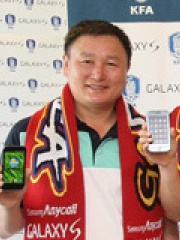
5. Huh Jung-moo (b. 1955)
With an HPI of 60.18, Huh Jung-moo is the 5th most famous South Korean Soccer Player. His biography has been translated into 25 different languages.
Huh Jung-moo (Korean: 허정무; Hanja: 許丁茂; born 13 January 1955) is a former South Korean football player and manager.

6. Ahn Jung-hwan (b. 1976)
With an HPI of 58.92, Ahn Jung-hwan is the 6th most famous South Korean Soccer Player. His biography has been translated into 34 different languages.
Ahn Jung-hwan (Korean: 안정환, Korean pronunciation: [ɐnd͡ʑʌŋɦwɐn] or [ɐn] [t͡ɕʌŋɦwɐn]; born 27 January 1976) is a South Korean television personality and former professional footballer. A versatile forward known for his technical skills and clutch goalscoring, Ahn represented South Korea at three FIFA World Cups, notably scoring a golden goal against Italy in 2002. Following his retirement, Ahn transitioned into a successful career in broadcasting, becoming a popular football commentator and television host. He is also recognised for his philanthropic endeavors.

7. Myung Rye-hyun (b. 1926)
With an HPI of 57.82, Myung Rye-hyun is the 7th most famous South Korean Soccer Player. His biography has been translated into 15 different languages.
Myung Rye-hyun (Korean: 명례현; born 14 April 1926) was a North Korean football player and manager. Myung was the head coach of the North Korea national team in the 1966 FIFA World Cup, when they became the first Asian team to reach the second round of the FIFA World Cup.

8. Kim Jung-nam (b. 1943)
With an HPI of 56.71, Kim Jung-nam is the 8th most famous South Korean Soccer Player. His biography has been translated into 16 different languages.
Kim Jung-nam (Korean: 김정남; Hanja: 金正男; born 28 January 1943) is a South Korean former football player and manager.

9. Lee Woon-jae (b. 1973)
With an HPI of 56.62, Lee Woon-jae is the 9th most famous South Korean Soccer Player. His biography has been translated into 32 different languages.
Lee Woon-jae (Korean: 이운재; born 26 April 1973) is a South Korean former football goalkeeper. He was part of South Korea's 1994, 2002, 2006 and 2010 FIFA World Cup campaigns. He was the only Asian player nominated for the IFFHS World's Best Goalkeeper of the 21st Century (2001–2011).
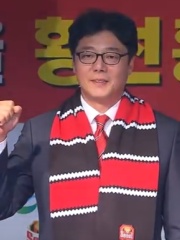
10. Hwang Sun-hong (b. 1968)
With an HPI of 56.51, Hwang Sun-hong is the 10th most famous South Korean Soccer Player. His biography has been translated into 28 different languages.
Hwang Sun-hong (born 14 July 1968) is a South Korean former football player and current manager of the South Korea national under-23 football team and manager of Daejeon Hana Citizen. His playing career included spells abroad at clubs in Germany and Japan, as well as 14 years representing the South Korea national football team, earning his first cap while still playing at college level.
People
Pantheon has 179 people classified as South Korean soccer players born between 1926 and 2006. Of these 179, 176 (98.32%) of them are still alive today. The most famous living South Korean soccer players include Cha Bum-kun, Son Heung-min, and Park Ji-sung. The most famous deceased South Korean soccer players include Chung Hae-won, Choi Dae-shik, and Cho Jin-ho. As of April 2024, 18 new South Korean soccer players have been added to Pantheon including An Ik-soo, Kim Pan-keun, and Shin Hong-gi.
Living South Korean Soccer Players
Go to all RankingsCha Bum-kun
1953 - Present
HPI: 70.61
Son Heung-min
1992 - Present
HPI: 67.72
Park Ji-sung
1981 - Present
HPI: 67.32
Hong Myung-bo
1969 - Present
HPI: 64.32
Huh Jung-moo
1955 - Present
HPI: 60.18
Ahn Jung-hwan
1976 - Present
HPI: 58.92
Myung Rye-hyun
1926 - Present
HPI: 57.82
Kim Jung-nam
1943 - Present
HPI: 56.71
Lee Woon-jae
1973 - Present
HPI: 56.62
Hwang Sun-hong
1968 - Present
HPI: 56.51
Lee Young-pyo
1977 - Present
HPI: 56.47
Park Chu-young
1985 - Present
HPI: 55.65
Deceased South Korean Soccer Players
Go to all RankingsNewly Added South Korean Soccer Players (2025)
Go to all RankingsAn Ik-soo
1965 - Present
HPI: 44.69
Kim Pan-keun
1966 - Present
HPI: 43.88
Shin Hong-gi
1968 - Present
HPI: 43.58
Cho Jin-ho
1971 - 2017
HPI: 43.04
Park Kun-ha
1971 - Present
HPI: 41.27
Jang Dae-il
1975 - Present
HPI: 39.73
Jang Hyung-seok
1972 - Present
HPI: 39.67
Kim Do-kyun
1977 - Present
HPI: 38.94
Hong Hyun-seok
1999 - Present
HPI: 37.78
Yun Il-lok
1992 - Present
HPI: 37.00
Lee Ki-je
1991 - Present
HPI: 36.29
Lee Dong-gyeong
1997 - Present
HPI: 35.98
Overlapping Lives
Which Soccer Players were alive at the same time? This visualization shows the lifespans of the 3 most globally memorable Soccer Players since 1700.

